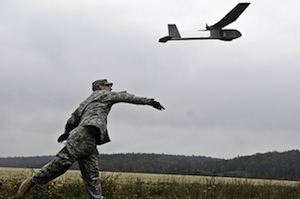Aviation Industry to FAA: Forget About Privacy
Last month, aviation industry executives asked the FAA to disregard concerns about civilian privacy when it comes to the potential future use of drones in domestic airspace.
Last month, aviation industry executives asked the FAA to disregard concerns about civilian privacy when it comes to the potential future use of drones in domestic airspace.
“We… recognize that the FAA has a number of initiatives underway supporting the integration of UAS [unmanned aircraft systems] into the NAS [national air space], and appreciate your recent comments that a number of challenges remain in this area,” a Nov. 8 letter from industry representatives to acting FAA Administrator Michael Huerta said. “It is our belief that for FAA to succeed, the agency must remain focused on safety rather than privacy issues, where the FAA has no statutory standing or technical expertise.” The letter was signed by the leaders of 20 industry interest groups, including the Aerospace Industries Association, the Air Traffic Control Association and Airlines for America.
What’s going on here? The assembled voices in favor of domestic drone use — all of whom stand to profit from the sale of UAVs (unmanned aerial vehicles) to police forces, government agencies and private corporations after the deregulation of national airspace — appear to be attempting to quash the question of privacy. Although a glance at the Federal Aviation Administration’s responsibilities reveals no explicit mention of the issue, the authors don’t say which government office should take responsibility for it. They seem to want to make the matter disappear from public discussion altogether.
The letter is a reaction to Rep. Ed Markey’s Drone Aircraft Privacy and Transparency Act, a recently introduced bill that calls for the FAA to conduct a study on the privacy implications of domestic drone use. The Massachusetts Democrat’s legislation would also require drone operators to make records of the information they collect that could be used to identify individuals and demonstrate how they would minimize the gathering of such information that is not directly related to a criminal investigation.
— Posted by Alexander Reed Kelly.
Your support matters…Rotor:
Additionally, as a goal the FAA should ensure that the introduction of UAS into the NAS not limit access to airspace or require modifications to the existing fleet of aircraft flying in the NAS beyond what is already currently anticipated to accommodate NextGen. The importance of airspace access cannot be overstated and FAA must aggressively protect its preeminent role as manager of the national airspace system. Lastly, it is important that the FAA ensure that the focus on UAS integration does not hinder agency progress on areas like certification of civil aircraft, repair stations, or operators where delays are already too commonplace or program improvements are lagging.
Independent journalism is under threat and overshadowed by heavily funded mainstream media.
You can help level the playing field. Become a member.
Your tax-deductible contribution keeps us digging beneath the headlines to give you thought-provoking, investigative reporting and analysis that unearths what's really happening- without compromise.
Give today to support our courageous, independent journalists.








You need to be a supporter to comment.
There are currently no responses to this article.
Be the first to respond.